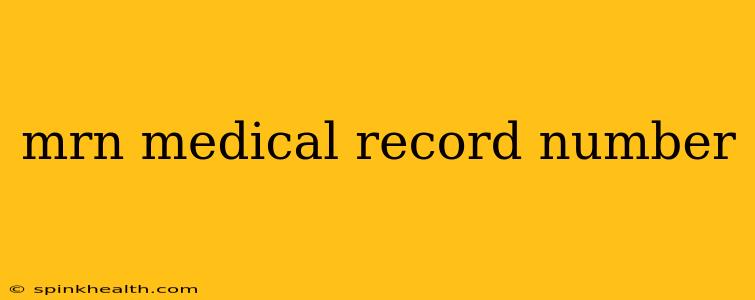Understanding Your MRN: The Key to Your Medical Records
Have you ever wondered what that seemingly random string of numbers and letters on your medical paperwork represents? It's your Medical Record Number (MRN), and it's the cornerstone of your entire medical history within a particular healthcare system. Think of it as your unique identifier, your personal key to accessing your health information. This comprehensive guide will unravel the mystery behind your MRN and answer some frequently asked questions.
What is a Medical Record Number (MRN)?
Imagine a vast library filled with countless books, each representing a patient's medical history. To quickly locate a specific book (patient record), you need a unique identifier – that's your MRN. It's a number, or sometimes a combination of numbers and letters, assigned to you by a healthcare provider upon your first visit. This number remains consistent throughout your interactions with that specific healthcare system – whether it's a hospital, clinic, or doctor's office within the same network. Different healthcare systems will assign different MRNs, even if it's for the same patient.
Why is my MRN different at different hospitals or clinics?
This is a crucial point! Each healthcare system (hospital, clinic, doctor's group) operates its own separate database. Therefore, they each assign their own unique MRN. Your MRN at Hospital A will be entirely different from your MRN at Hospital B, even if you received care at both locations. This is primarily for organizational and data security reasons. Think of it like different library systems having their own unique cataloging system.
How is my MRN used?
Your MRN acts as the central index for all your medical information within a given healthcare system. When you visit, staff use your MRN to quickly access your complete medical records, including:
- Test results: Blood work, imaging (X-rays, CT scans, MRIs), etc.
- Treatment history: Medications prescribed, procedures performed, surgeries undergone.
- Doctor's notes: Detailed accounts of your visits and consultations.
- Allergies and medical conditions: A complete list of allergies and diagnosed health problems.
This ensures healthcare providers have all the necessary information to deliver the best possible care.
What if I need to access my medical records?
Most healthcare systems allow patients to access their medical records electronically through online portals or by requesting paper copies. You will almost certainly need your MRN to facilitate this access. Check with your healthcare provider for their specific policies and procedures for accessing your records. Often, you'll need to provide identification for security purposes.
Is my MRN confidential?
Your MRN, along with all the information contained in your medical record, is protected by strict confidentiality laws. Healthcare providers are legally and ethically obligated to keep your information secure and private. Only authorized personnel with a legitimate need for the information can access your records.
What if I lose my MRN?
Don't panic! If you lose or forget your MRN, contact the healthcare provider's administrative office or patient services department. They can usually retrieve your MRN using your name, date of birth, and other identifying information.
In conclusion, your MRN is a vital piece of information. Understanding its purpose and how it's used is key to managing your healthcare effectively. Remember that it's specific to each healthcare system, and respecting its confidential nature is crucial for safeguarding your health information.

